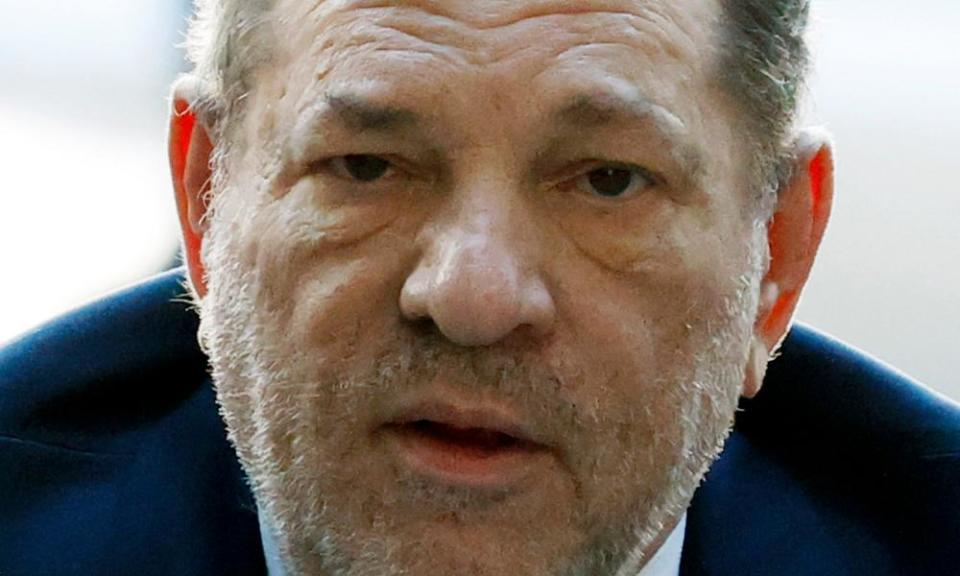The Guardian view on Harvey Weinstein: a rapist behind bars

Harvey Weinstein was not the first powerful man to be accused of assaulting and raping women. But the movie producer’s conviction in a New York court, hard fought for and long overdue, is a welcome step forward in the march for justice. He was found guilty of raping one woman and committing a nonconsensual oral sex act on another. The trial exposed just how difficult it is to bring the rich and connected to court for such crimes. The verdict was a triumph for the #MeToo movement, which has seen millions of women share their experiences of abuse and intimidation. Yet it was a bittersweet one. Ashley Judd, the first actor to publicly accuse Weinstein of sexual misconduct, wrote that while she was celebrating the verdict, “I am thinking about how it took 90 women coming forward for two guilty convictions”.
The law caught up with the producer after decades of abuse claims. Survivors had come forward, only to be scared off. Until exposés in 2017 by the New York Times and the New Yorker, journalists had been put off the scent by Weinstein’s pressure tactics. Although the New York district attorney eventually got his man, he has faced repeated accusations throughout of backing down from sex-crime cases when influential men were accused. This is a familiar and depressing chain of events that must be broken.
Many people, but particularly women, have become jaded over the years by accounts of failed rape prosecutions – of accusers humiliated by intrusive cross-examination and abuse on social media, while those they have accused have walked away. In England and Wales, cuts to police and criminal justice funding, combined with other factors including issues surrounding digital evidence, have led to a full-blown crisis, with prosecutions and convictions for rape falling to their lowest levels in more than a decade.
Monday’s verdict is not the end of the issue. One trial can’t be expected to change everything – in the US, the UK or elsewhere. It is not even the end of the Weinstein story. He will be sentenced next month and faces a minimum of five years in prison on the criminal sexual assault charge; Los Angeles prosecutors have also filed charges, including rape, related to two alleged incidents that are reported to have taken place in 2013. But the verdict marks a close to a vitally important chapter. It has shown that even the most aggressive and victim-blaming defence tactics can be defeated. Vulnerable witnesses who do not conform to the mythical type of the “perfect victim” can still be believed. The fact that the two women Weinstein was convicted of harming kept up relationships with him after they were attacked did not disqualify them from sympathy or justice.
The conversation that began in Hollywood must not end there. As the journalist Jodi Kantor said of her motives when she began to look into allegations that stars had been harassed, or worse, the point was to prove that “nobody’s immune”. It is striking how widely the #MeToo movement has resonated. Many of the women most vulnerable to sexual harassment and abuse have no platform. Workers in the casualised economy, undocumented migrants and others are invisible victims. Even when they come forward, few are likely to pay much attention to their abusers. They too deserve sympathy and support.
In recent years it has become increasingly clear how often powerful men have been able to silence those they have harmed and to escape the consequences. On Tuesday came another grim reminder as an independent inquiry into child sexual abuse related to Westminster found that political parties, police and prosecutors had “turned a blind eye” to serious allegations and ignored victims.
There are still too many predators and too much exploitative behaviour. Yet the Weinstein case, like others, is a welcome sign that the assumption that powerful men can set their own rules is unravelling in many spheres of life. There is still much further to go. This is more than just a question of criminal proceedings or even workplace rules. It is about how we conduct ourselves and how we raise our children to respect one another. Bringing abusers to book is essential. Preventing abuse must be the ultimate goal.

 Yahoo News
Yahoo News 